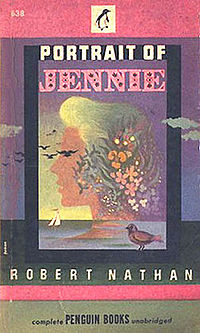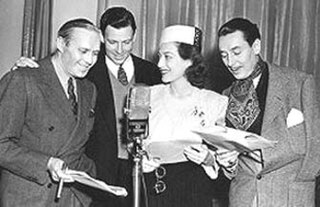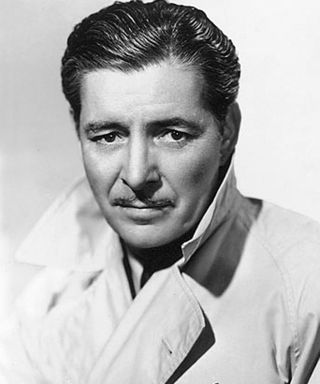Related Research Articles

Suspense is a radio drama series broadcast on CBS Radio from 1940 through 1962.
Escape is an American radio drama. It was radio's leading anthology series of high-adventure radio dramas, airing on CBS from July 7, 1947 to September 25, 1954.
The Six Shooter is a United States Western old-time radio program starring James Stewart as a gunfighter. It was created by Frank Burt, who also wrote many of the episodes, and lasted only one season of 39 episodes on NBC. Initially, it was broadcast on Sundays at 9:30 pm Eastern Time, through October 11. Then it was heard at 8:30 pm for three weeks. Finally, on November 8, 1953, through March 21, 1954, it was broadcast Sundays at 8 pm; beginning April 1, 1954, through the final episode, it was on Thursdays at 8:30 pm. One old-time radio directory called the program "a last, desperate effort by a radio network (NBC) to maintain interest in adventure drama by employing a major Hollywood movie star in the leading role."

Lux Radio Theatre, sometimes spelled Lux Radio Theater, a classic radio anthology series, was broadcast on the NBC Blue Network (1934–35) ; CBS Radio network (1935–54), and NBC Radio (1954–55). Initially, the series adapted Broadway plays during its first two seasons before it began adapting films. These hour-long radio programs were performed live before studio audiences. The series became the most popular dramatic anthology series on radio, broadcast for more than 20 years and continued on television as the Lux Video Theatre through most of the 1950s. The primary sponsor of the show was Unilever through its Lux Soap brand.

An anthology series is a written series, radio, television, film, or video game series that presents a different story and a different set of characters in each different episode, season, segment, or short. These usually have a different cast in each episode, but several series in the past, such as Four Star Playhouse, employed a permanent troupe of character actors who would appear in a different drama each week. Some anthology series, such as Studio One, began on radio and then expanded to television.

Academy Award is a CBS radio anthology series, which presented 30-minute adaptations of plays, novels, or films.

Ford Theatre, spelled Ford Theater for the original radio version and known, in full, as The Ford Television Theatre for the TV version, is a radio and television anthology series broadcast in the United States in the 1940s and 1950s. At various times the television series appeared on all three major television networks, while the radio version was broadcast on two separate networks and on two separate coasts. Ford Theatre was named for its sponsor, the Ford Motor Company, which had an earlier success with its concert music series, The Ford Sunday Evening Hour (1934–42).

The Screen Guild Theater is a radio anthology series broadcast from 1939 until 1952 during the Golden Age of Radio. Leading Hollywood stars performed adaptations of popular motion pictures. Originating on CBS Radio, it aired under several different titles including The Gulf Screen Guild Show, The Gulf Screen Guild Theater, The Lady Esther Screen Guild Theater and The Camel Screen Guild Players. Fees that would ordinarily have been paid to the stars and studios were instead donated to the Motion Picture Relief Fund, and were used for the construction and maintenance of the Motion Picture Country House.
Starring Boris Karloff was an American radio and television anthology series broadcast for 13 weeks, September–December 1949, on the ABC Television network. Boris Karloff was the host and occasional star, with music by organist George Henninger. Produced and directed by Charles Warburton, the series adapted short stories of mystery and suspense.
Hollywood Playhouse, also known as Woodbury Hollywood Playhouse, is a radio anthology drama series that featured adaptations of plays and short stories. Created as a showcase for Tyrone Power, the series began October 3, 1937, on the Blue Network, with Darryl F. Zanuck introducing his 20th Century-Fox star. The half-hour program aired Sundays at 9 p.m. ET until September 1939, when it was moved to the NBC Red Network Wednesdays at 8 pm ET. Woodbury Soap and Jergens Lotion sponsored the show.
Philip Morris Playhouse is a 30-minute old-time radio dramatic anthology series.
The Dreft Star Playhouse was a daytime radio program in the United States, presenting adaptations of romantic movies in serial form. It was broadcast on NBC June 28, 1943 – March 30, 1945. The show's original title was Hollywood Theatre of the Air, but that changed effective October 18, 1943, "[t]o avoid conflict with similar titles."
The Cresta Blanca Hollywood Players was a dramatic anthology radio series. It was broadcast on CBS September 3, 1946 – February 26, 1947.
Mayor of the Town is a radio comedy-drama in the United States. From September 6, 1942, to July 3, 1949, it was broadcast at various times on ABC, CBS, Mutual and NBC.
For the interview program of the same name, see Hollywood Star Time .
Stars over Hollywood is a radio anthology in the United States. It was broadcast on CBS from May 31, 1941, to September 25, 1954, sponsored first by Dari-Rich, Carnation Milk and later by Armour and Company.
The MGM Theater of the Air is a one-hour radio dramatic anthology in the United States. It was broadcast on WMGM in New York City and syndicated to other stations via electrical transcription October 14, 1949 – December 7, 1951. It was carried on Mutual January 5-December 27, 1952.

For the television series of the same name, see The Silver Theatre.
Brownstone Theater is an old-time radio dramatic anthology series in the United States. It was broadcast on the Mutual Broadcasting System February 21, 1945 – September 23, 1945.

Favorite Story is an American old-time radio dramatic anthology. It was nationally syndicated by the Ziv Company from 1946 to 1949. The program was "advertised as a show that 'stands head and shoulders above the finest programs on the air'". Originating at KFI in Los Angeles, California, Favorite Story apparently was not related to the similarly named My Favorite Story that ran on KNX in Los Angeles earlier.
References
- 1 2 3 4 Dunning, John (1998). On the Air: The Encyclopedia of Old-Time Radio (Revised ed.). New York, NY: Oxford University Press. p. 326. ISBN 978-0-19-507678-3 . Retrieved 2019-10-13.
- ↑ "Stewart to Star". The Sunday Star. April 23, 1950. Retrieved 2 August 2014.
- 1 2 3 4 "Hollywood Star Playhouse". The Digital Deli Too. Retrieved 2 August 2014.
- ↑ Dunning, John. (1976). Tune in Yesterday: The Ultimate Encyclopedia of Old-Time Radio, 1925-1976. Prentice-Hall, Inc. ISBN 0-13-932616-2. P. 284.
- ↑ "The saturation boys are back" (PDF). Sponsor. 5 (8): 43. April 1, 1951. Retrieved 1 August 2014.
- ↑ "Report to Sponsors" (PDF). 6 (4). February 25, 1952. Retrieved 2 August 2014.
{{cite journal}}: Cite journal requires|journal=(help) - ↑ "Report to Sponsors" (PDF). 6 (2). January 28, 1952: 2. Retrieved 2 August 2014.
{{cite journal}}: Cite journal requires|journal=(help) - ↑ "MCA advertisement" (PDF). Broadcasting. January 13, 1958. Retrieved 1 August 2014.